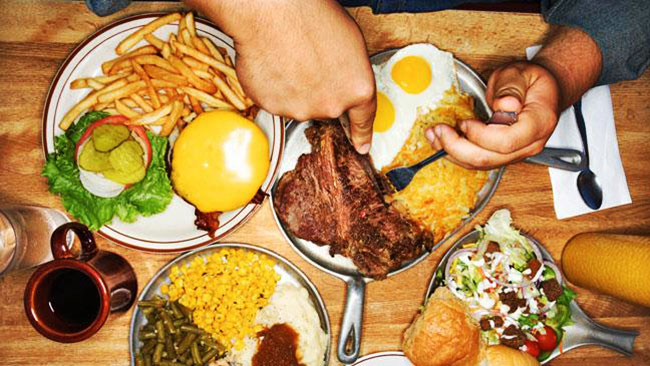|

by EDITOR
October 2, 2012
from
PreventDisease Website
Spanish version

The food industry as planned mass
over-consumption very well.
They have created an abundance of
consumers who can't help but eat themselves into oblivion. Most
people don't even realize who much food they're actually consuming.
New research indicates that diets that
lead to obesity - specifically diets high in refined sugars - may
cause changes to the brains of obese people that in turn may fuel
over-consumption of those same foods and make weight loss more
challenging.
The research by Terry Davidson,
director of American University's Center for Behavioral
Neuroscience, showed that it becomes a recurring behavior.
"It is a vicious cycle that may
explain why obesity is so difficult to overcome," said Davidson,
also a professor of psychology at AU.
Davidson recently published
his research, "The Effects of a
High-Energy Diet on Hippocampal-Dependent Discrimination Performance
and Blood-Brain Barrier Integrity Differ for Diet-Induced Obese and
Diet-Resistant Rats," in the journal Physiology & Behavior.
Fat Rats
Suffer Memory Impairment, Damage to Brain's Armor
Davidson, formerly with Purdue University, focuses his research on
the hippocampus - the part of the brain responsible for memory and
learning.
For this study, Davidson and his team trained rats given restricted
access to low-fat "lab chow" on two problems - one that tested the
rats' hippocampal-dependent learning and memory abilities and one
that did not.
Once the training phase completed, the
rats were split into two groups: one group had unlimited access to
the low-fat lab chow, while the other had unlimited access to
high-energy (high-fat/calorie) food.
The high-energy food was high in cottonseed oil - considered to be
the most unhealthful dietary fat as research has linked it to
cardiovascular disease and certain types of cancer.
Cotton is the
fourth genetically modified crop for the extraction of oil. In the
United States, this is a commonly used oil and component in various
prepackaged and processed foods.
When both groups of rats were presented the problems again, the rats
that became obese from the high-energy diet performed much more
poorly than the non-obese rats did on the problem designed to test
hippocampal-dependent learning and memory.
They tested the same as the non-obese
rats on the other problem.
When the researchers later examined all of the rats' blood-brain
barriers (if the brain were an exclusive nightclub, the blood-brain
barrier - a tight network of blood vessels protecting the brain -
would be the bouncer at the door carefully policing who gets in),
they found that the obese rats' blood-brain barriers had become
impaired as they allowed a much larger amount of a dye that does not
freely cross the blood-brain barrier into the hippocampus than did
blood-brain barriers of the non-obese rats (the dye was administered
to all of the rats).
Interestingly, the non-obese rats group included rats from both the
low-fat lab chow group and the high-energy diet group.
But this isn't a matter of some rats
having a super-high metabolism that allowed them eat to large
amounts of the high-energy food and remain a reasonable weight.
"The rats without blood-brain
barrier and memory impairment also ate less of the high-energy
diet than did our impaired rats," Davidson said.
"Some rats and some people have a
lower preference for high-energy diets. Our results suggest that
whatever allows them to eat less and keep the pounds off also
helps to keep their brains cognitively healthy."
A Vicious
Cycle
The hippocampus is also responsible for suppressing memories.
It could be that a diet high in toxic
saturated fats and refined sugars impacts the hippocampus's ability
to suppress unwanted thoughts - such as those about high-calorie
foods, making it more likely that an obese person will consume those
foods and not be able to stop at what would be considered a
reasonable serving.
"What I think is happening is a
vicious cycle of obesity and cognitive decline," Davidson said.
"The idea is, you eat the high
fat/high calorie diet and it causes you to overeat because this
inhibitory system is progressively getting fouled up.
And
unfortunately, this inhibitory system is also for remembering
things and suppressing other kinds of thought interference."
Davidson's findings are compatible with
other studies finding a link between human obesity in middle age and
an increased likelihood of developing Alzheimer's disease and other
cognitive dementias later in life.
"We are trying to figure out that
link," Davidson said.
"We have compelling evidence that
overconsumption of a high fat diet damages or alters the
blood-brain barrier. Now we are interested in the fact that
substances that are not supposed to get to the brain are getting
to it because of this breakdown.
You start throwing things into
the brain that don't belong there, and it makes sense that brain
function would be affected."
A Lifelong
Battle
As evidenced by contestants of NBC's reality show "The Biggest
Loser," formerly obese celebrities who undergo gastric by-pass
surgery, and other numerous examples of extreme weight loss, it is
possible for obese people to win the battle of the bulge.
Unfortunately, the attempt to keep it
off is, more often than not, a lifelong battle that requires
permanent lifestyle changes.
Davidson says this could be due in part
to permanent changes in the brain.
"I do think it [the damage] becomes
permanent, but I don't know at what point it becomes permanent,"
Davidson said.
"Other research has found that obese
people and formerly obese people have weaker hippocampal
activity when consuming food than do people who have never been
obese.
Just because you lose the weight doesn't mean you regain
the brain function. This could help explain why it is so
difficult for formerly obese people to keep the weight off."
|


